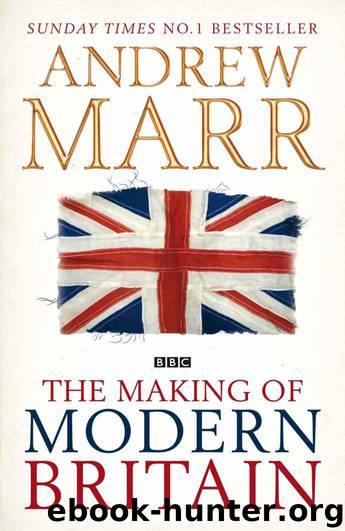The Making of Modern Britain by Marr Andrew

Author:Marr, Andrew [Marr, Andrew]
Language: eng
Format: mobi
Publisher: Macmillan
Published: 2009-02-09T16:00:00+00:00
There were worse worlds for revolutionaries, and more serious revolutionaries too. In the final days of a freezing November in 1923 in a grimy street in Pollockshaws, just outside Glasgow, a former schoolmaster gave his only overcoat to a destitute immigrant from Barbados. Soon afterwards, aged just forty-four, the teacher himself died from cold and hunger. More than 10,000 people marched behind his coffin. A stocky, self-certain Marxist agitator, John Maclean was reputedly described by Lloyd George as the most dangerous man in Britain. He had certainly been discussed by the cabinet and hailed across Russia. In Britain he is mostly forgotten, but his face was once on a Russian postage stamp. Lenin had appointed him the Soviet Union’s consul in Glasgow and he had been made the honorary president of the Petrograd Soviet. From a fiercely religious Presbyterian family of Highlanders, seditious, openly hostile to the war against Germany and repeatedly imprisoned for his speeches, Maclean was the most charismatic revolutionary of the time. The important thing, however, is that he and his comrades were completely unsuccessful.
It had not always seemed that way. The war had meant heavy demands on Clydeside ship workers. Housing was short, rents went up, hours were increased and food prices rose. Maclean and other socialists had their first big victory in November 1915 when a rent strike by tenants refusing to pay more for their foul tenement flats had landed up in the Glasgow courts. Thousands joined them to show their support, including munitions workers. Maclean called on the government to freeze rents for the rest of the war, or face a general strike: the Rent Restrictions Act which followed seemed like a climb-down. He went on making seditious speeches and was repeatedly arrested and finally imprisoned, leading to a nervous breakdown. Let out in 1917 because of his poor health, he was soon back setting up Marxist education classes in Glasgow. By May 1918 Maclean was on trial again, declaring to the judge: ‘I come here not as the accused but as the accuser of capitalism, dripping with blood from head to foot.’ He was duly sentenced to five years in prison, where he went on hunger strike and was finally released early when the war ended on 11 November. He then stood in the 1918 election but at a time of patriotic fervour was easily defeated.
Yet the aftermath of the war produced a more excited mood in the shipyards and the surrounding slums than before. Clyde workers wanted a shorter week, to spread the work around. The old worries about higher rents and vile housing were back with a vengeance. This, surely, was the revolutionaries’ moment. The months ahead would bring the most dramatic confrontation in Glasgow’s political history. But Maclean and other Marxists were barely involved. They squabbled about which parties should be formed to carry the communist flag, who should lead them and what could be done to help Russia. Less ideological men led the great ‘forty hours strike’ of January 1919.
Download
This site does not store any files on its server. We only index and link to content provided by other sites. Please contact the content providers to delete copyright contents if any and email us, we'll remove relevant links or contents immediately.
| Elections & Political Process | Ideologies & Doctrines |
| International & World Politics | Political Science |
| Public Affairs & Policy | Specific Topics |
| United States |
The Secret History by Donna Tartt(19092)
The Social Justice Warrior Handbook by Lisa De Pasquale(12191)
Thirteen Reasons Why by Jay Asher(8912)
This Is How You Lose Her by Junot Diaz(6889)
Weapons of Math Destruction by Cathy O'Neil(6281)
Zero to One by Peter Thiel(5802)
Beartown by Fredrik Backman(5756)
The Myth of the Strong Leader by Archie Brown(5509)
The Fire Next Time by James Baldwin(5448)
How Democracies Die by Steven Levitsky & Daniel Ziblatt(5219)
Promise Me, Dad by Joe Biden(5154)
Stone's Rules by Roger Stone(5088)
A Higher Loyalty: Truth, Lies, and Leadership by James Comey(4964)
100 Deadly Skills by Clint Emerson(4927)
Rise and Kill First by Ronen Bergman(4790)
Secrecy World by Jake Bernstein(4753)
The David Icke Guide to the Global Conspiracy (and how to end it) by David Icke(4720)
The Farm by Tom Rob Smith(4514)
The Doomsday Machine by Daniel Ellsberg(4490)
